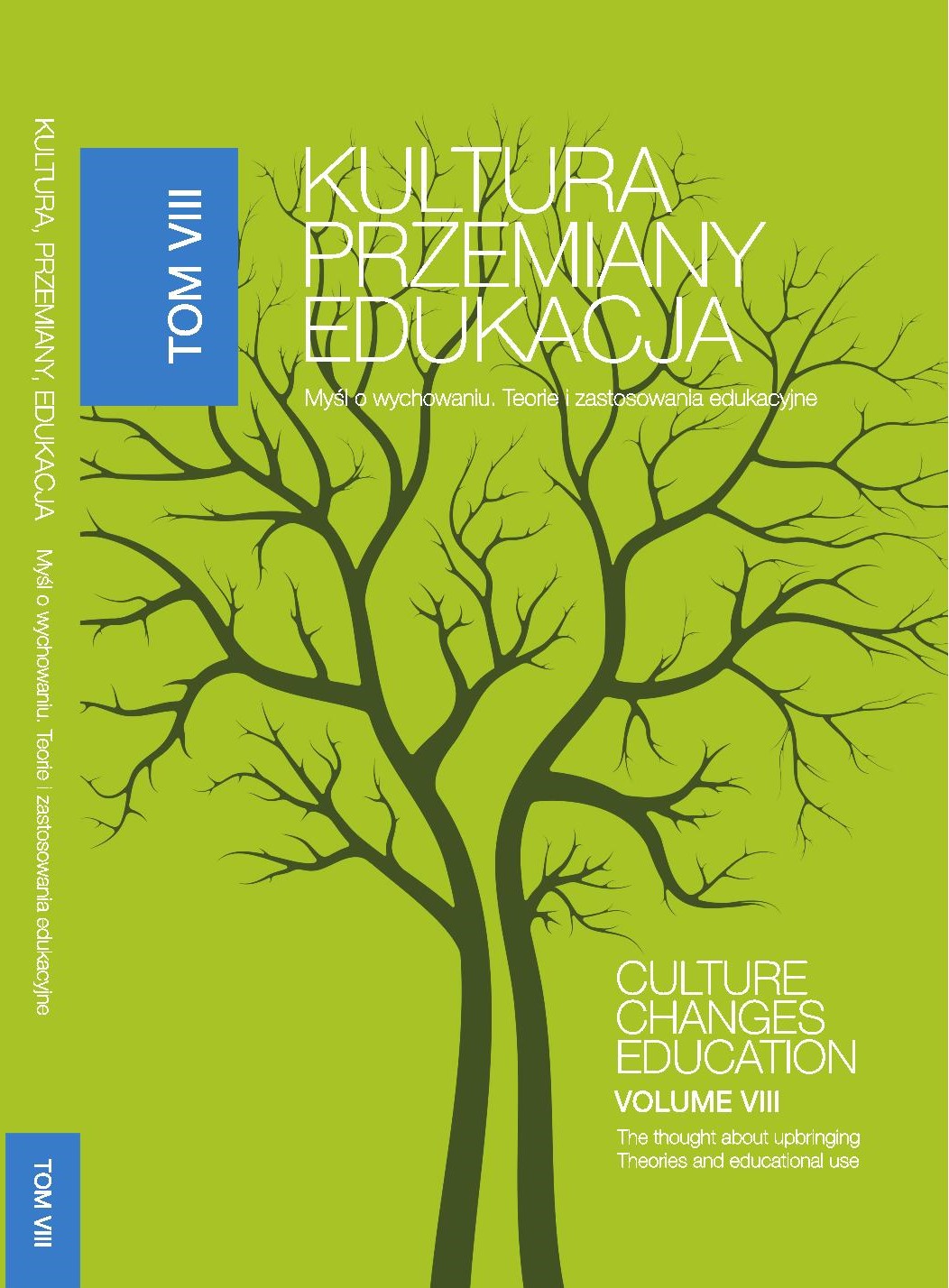Cultural and educational activity of the Association of Young Catholic Craftsmen 'Skała' in Lviv (1856-1914)
DOI:
https://doi.org/10.15584/kpe.2020.8.2Keywords:
the associations of workers, education and cultural animation, the turn of 19th and 20th century, LvivAbstract
In the times of the Partitions, the Austrian authorities permitted, in the year 1856, that a Polish association of craftsmen combining mutual aid with cultural and educational activity be established. Within the scope of the activity of 'Skała', two periods are distinguished: paternalistic, until the year 1889, and also democratised, after making changes in the articles of association in this latter year. In the first period of its activity, only be craftsman apprentices being bachelors enjoyed the right to become the full members, and women were not permitted to join the Association. The members of it had no say in the aspect of electing the governing bodies, or the decisions made by them. The reason for that fact was that the organisation was more like a brotherhood of people sharing the same religious convictions. Making changes in the articles of association in the year 1889 introduced the democratic rules of functioning the Association. Since that time on, anyone who was a male follower of catholic faith, be it a cratfsman or an industrialist, was permitted to join it. All the authorities of the organisation were elected. The objective of the Association was to educate catholic youths, nurturing religious spirit among them and educating them to become good craftsmen. The leading forms of the activity were general and vocational further training. The cultural sphere included the activity of own groups of artists: a choir, an orchestra and a theatre ensemble. A significant role in Polish patriotic upbringing was that played by the celebrations of national anniversaries: the Constitution of the Third of May, the national uprisings and the PolishLithuanian Union. The means of attaining this objective was also literary soirées dedicated to poets and writers having merits for Polish nation: Adam Mickiewicz, Kornel Ujejski, Józef Ignacy Kraszewski and Henryk Sienkiewicz.
Downloads
References
Albin J., Z działalności bibliotek ludowych w Galicji. Biuletyn Biblioteki Jagiellońskiej R. XXXII, 1982, nr 1–2, s. 77–101.
Aleksander T., Działalność polskich stowarzyszeń kultury w Galicji doby autonomicznej [w:] Galicja i jej dziedzictwo. Literatura – język – kultura. t. 4. Red. C. Kłak, M. Wyka, Wydawnictwo Wyższej Szkoły Pedagogicznej, Rzeszów 1995, s. 139–153.
Białynia-Chołodecki J., Półwiekowa przeszłość Stowarzyszenia Katolickiej Młodzieży Rękodzielniczej „Skała” we Lwowie, Stowarzyszenie „Skała”, Lwów 1906.
Białynia-Chołodecki J., „Skała”. W 75-tą rocznicę istnienia i działalności, Stowarzyszenie „Skała”, Lwów 1931.
Bogucka M., Dzieje kultury polskiej do 1918 roku, Zakład Narodowy im. Ossolińskich, Wrocław 1987 (etc.) .
Falkowska J., W służbie edukacji kobiet. Działalność Felicji Boberskiej z Wasilewskich (1825–1889). Studia Paedagogica Ignatiana t. XIX, 2016, vol. 3, s. 123–140.
Karwacki W.L., Wiedza historyczna robotników polskich w latach zaborów. (Przyczynek do badań). Polska Klasa robotnicza. Studia historyczne t. 9, 1980, s. 139–188.
Konopka M., Książka w środowisku lwowskich rzemieślników. Cz. 1. Katalog książek z Biblioteki Stowarzyszenia Rękodzielników „Gwiazda” we Lwowie, Wydawnictwo Naukowe Akademii Pedagogicznej, Kraków 2003.
Korniłowicz K., Pomoc społeczno-kulturalna dla młodzieży pracującej i dorosłych. Wybór pism. Zakład Narodowy im. Ossolińskich, Wrocław 1976.
Kozłowska-Sabatowska H., Ideologia pozytywizmu galicyjskiego 1864–1881, Zakład Narodowy im. Ossolińskich, Wrocław 1978 (etc.).
Kruszewska Z., Popularyzacja muzyki [w:] Praca oświatowa. Jej zadania, metody, organizacja, Kraków1913, s. 473–483.
Najdus W., Klasowe związki zawodowe w Galicji. Przegląd Historyczny 1960, 51/1, s. 123–154.
Najdus W., Oświata robotnicza w Galicji w dobie autonomicznej. Polska Klasa Robotnicza. Studia historyczne 1983, t. 10, s. 65–100.
Najdus W., Wzorce kulturowo-obyczajowe galicyjskich rzemieślników [w:] Drobnomieszczaństwo XIX i XX wieku, T. 1, red. S. Kowalska-Glikman, Państwowe Wydawnictwo Naukowe, Warszawa 1984, s. 39–87.
Najdus W., Ewolucja stowarzyszeń rzemieślników galicyjskich w latach 1772–1918 [w:] Drobnomieszczaństwo XIX i XX wieku, T. 3, red. S. Kowalska-Glikman, Wydawnictwo Naukowe PWN,Warszawa 1992, s. 68–130.
Nitecki P.. Odelgiewicz Zygmunt Kajetan [w:] Encyklopedia katolicka, T. 14, Towarzystwo Naukowe Katolickiego Uniwersytetu Lubelskiego Jana Pawła II, Lublin 2010, 302.
Orsza H. [H. Radlińska], Nasze biblioteki powszechne [w:] Praca oświatowa. Jej zadania, metody, organizacja, Kraków 1913, s. 211–267.
Orsza H. [H. Radlińska], Praca oświatowa wobec zadań wychowania narodowego [w:] Praca oświatowa. Jej zadania, metody, organizacja, Kraków 1913, s. 143–152.
Panasiewicz A.E., Głosy kuratorów i członków stowarzyszenia „Skała” [w:] J. Białynia-Chołodecki, Półwiekowa przeszłość Stowarzyszenia Katolickiej Młodzieży Rękodzielnicze „Skała” we Lwowie, Stowarzyszenie „Skała”, Lwów 1906, s. 107–113.
Potoczny J., Teoria elementarnego kształcenia dorosłych, popularyzacja wiedzy i czytelnictwa w Galicji doby autonomicznej [w:] Z tradycji polskiej teorii i praktyki andragogicznej, red. E. SapiaDrewniak, A. Stopińska-Pająk, Wydawnictwo Adam Marszałek, Toruń 1997, 21–38.
Rechowicz M., Lwowskie lata Adama Stefana Sapiehy [w:] Księga Sapieżyńska. T. 1, red. J. Wolny. Polskie Towarzystwo Teologiczne, Kraków1982, s. 49–54.
„Rękodzielnik” (1869) nr 4. Sprawozdanie Katolickiego Towarzystwa Młodzieży Rękodzielniczej „Skała” za rok 1883, Lwów 1884.
Sprawozdanie Wydziału Stowarzyszenia Katolickiej Młodzieży Rękodzielniczej „Skała” za rok 1887, Lwów 1888.
Sprawozdanie Wydziału Stowarzyszenia Katolickiej Młodzieży Rękodzielniczej „Skała” za rok 1889, Lwów 1890.
Stopińska-Pająk A., Polska oświata dorosłych w Galicji na przełomie XIX i XX wieku [w:] Galicja i jej dziedzictwo. Nauka i oświata, T. 3, red. A. Meissner, J. Wyrozumski, Wydawnictwo Wyższej Szkoły Pedagogicznej, Rzeszów 1995, s. 239–249.
Stopińska-Pająk A. Pierwszy polski podręcznik andragogiki [w:] Z tradycji polskiej teorii i praktyki andragogicznej, red. E. Sapia-Drewniak, A. Stopińska-Pająk, Wydawnictwo Adam Marszałek, Toruń 1997, s. 8–19.
Surzyński S. Harfiarz. Zbiór pieśni patriotycznych i narodowych na cztery męskie głosy, Tarnów 1891, J. Pisz.
Terlecki R., Początki oświaty dorosłych i popularyzacji nauki w autonomicznej Galicji w latach 1867-1880. Rozprawy z Dziejów Oświaty 1988, nr 31, 127–165.
Terlecki R., Oświata dorosłych i popularyzacja nauki w Galicji w okresie autonomii, Zakład Narodowy im. Ossolińskich, Wrocław 1990 (etc.).
Żardecki W., Dylematy przemian animacji kulturalnej w perspektywie historycznej [w:] Dylematy animacji kulturalnej, red. J. Gajda, W. Żardecki, Wydawnictwo Uniwersytetu Marii Curie-Skłodowskiej, Lublin 2001, s. 63–81.
Downloads
Published
How to Cite
Issue
Section
License
Copyright (c) 2020 KULTURA – PRZEMIANY – EDUKACJA

This work is licensed under a Creative Commons Attribution-NoDerivatives 4.0 International License.


